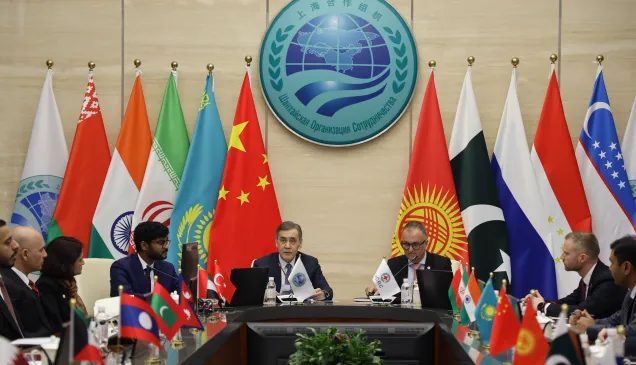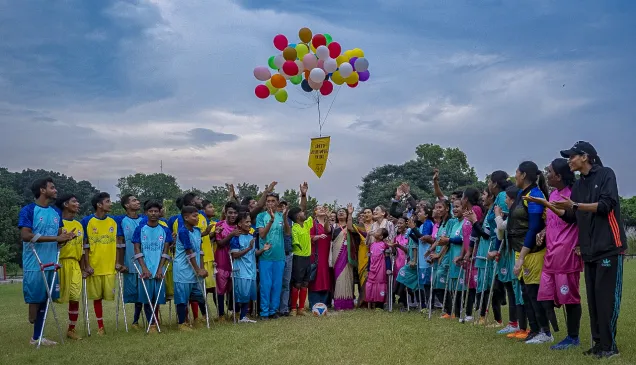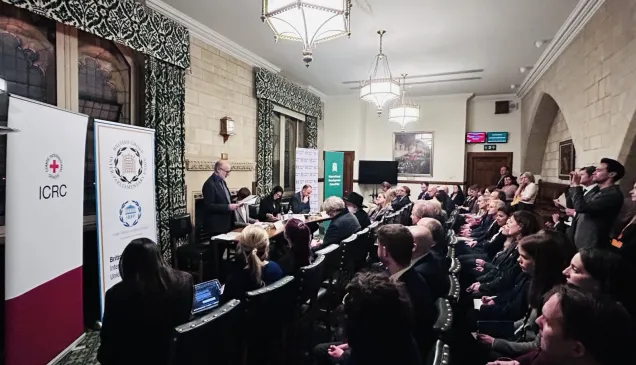Peter Maurer on ethical principles of health care in conflict
Speech given by Peter Maurer, President of the ICRC, at the launch of the "Ethical Principles of Health Care in Times of Armed Conflict and Other Emergencies."
Dear colleagues,
Dear friends,
The nature of humanitarian work often has me deliver speeches with words of warning and caution, and with descriptions of the particularly distressing situations in which victims of violence find themselves. I am glad to deviate from such patterns today, at the launch of our "Ethical principles of health care in times of armed conflict and other emergencies".
Agreeing on these principles is indeed a substantive achievement and I would like to thank the World Medical Association (WMA), the International Committee of Military Medicine (ICMM), the International Council of Nurses (ICN) and the International Pharmaceutical Federation (FIP) for their participation and commitment to this process under the auspices of the ICRC.
The ethical principles we are launching today are a ground-breaking document because now, for the first time, our global associations have a common and concise set of shared principles. They will apply to more than 30 million professionals, civilian and military, who may face ethical dilemmas in times of armed conflict and other emergencies.
As we all know, modern international humanitarian law (IHL) originated from the idea that enhancing the protection of the medical mission – personnel, transports and units alike – was an essential step to better assist and protect victims of armed conflict.
This idea was at the core of the international consensus, which led to the first Geneva Convention of 1864. Today, this consensus seems to be becoming more elusive by the day.
Armed conflicts and emergencies are too often characterized by scores of people in urgent need of medical care as well as widespread destruction of health infrastructure and massive displacements of health personnel. In consequence, the pressure on the few remaining in the midst of combats and emergencies becomes all the more important.
During armed conflict and other emergencies, assaults on health facilities, health workers, and the patients they serve, are all too common. Aside from the immediate human toll they take, such attacks result in obstructed access to health services, they compromise the ability to deliver care to populations in great need, they weaken the presence of skilled health workers, they affect health systems overall and hamper efforts to reconstruct such systems and health infrastructure after war.
In 2011, the ICRC, together with other partners of the International Red Cross and Red Crescent Movement, began the Health Care in Danger project. The latest report on violent incident against health care, released in April 2015, analysed 2,398 incidents collected in 11 countries from January 2012 to December 2014. The report concludes that over 50% of the attacks took place against, inside or nearby health care facilities and that at least 598 health care personnel lost their lives or were wounded during an attack. In addition, over 700 medical transports were directly or indirectly affected. In most incidents, local health care workers were affected most seriously. As a consequence of such violence, health care facilities were forced to suspend operations fully or completely, and health care personnel and victims in need of medical treatment avoided going back to health care facilities, fearing arrest, intimidation, harassment, assault, or death.
Every day, more and more detailed information is coming to light, confirming such findings: according to the organization Physicians for Human Rights, in Syria in 2014 alone, on average one medical worker was killed every other day and a hospital was attacked every four days.
Indeed, delivering health services to victims of conflict without distinction or discrimination is an increasingly complex challenge in contemporary conflicts.
This is why the ethical principles of health care in times of armed conflict and other emergencies we are launching together today is so uniquely important. Be it in Yemen, in Mali or in Syria, doctors and nurses are exposed to threats and violence aimed at thwarting their medical duties every day. And within the constraints of armed conflict, they too often find themselves confronted with acute ethical dilemmas and – until now – without much guidance.
Existing norms are no longer sufficient and the general consensus that the medical mission has to be respected in all circumstances has slipped into the background while abuses have increased from sporadic to systematic.
That is why we call on governments to help improve the situation and put an end to these violations of international humanitarian law. The ICRC is raising the issue in multilateral fora, both regional and global, not only to increase awareness but to get States to take concrete action. Now that all major professional organisations have come together, we expect States and international organisations to offer political support to our efforts and to use all means available to facilitate their implementation.
As co-authors, we will not stop our efforts now that the principles have been agreed upon. Beyond reaching out to States and authorities, we will remain committed to engaging professionals and experts in their fields, to use the principles in the real dilemmas they face every day.
Traditionally, the ICRC addresses humanitarian challenges through assisting and protecting affected populations as directly as possible. But this is not sufficient given the complexities of the challenges we face. We have a collective responsibility to prevent the re-occurrence of abuses by developing normative instruments and promoting the compliance with norms and standards. Beyond relief work, and beyond engagement with States, the practical cooperation with professional networks is of critical importance. By pooling experience, knowledge, and expertise of professionals, we create standards that hold up to the challenges of practice.
In the past, this approach has proven productive when we devised a manual on war surgery which is now used across the world by surgeons operating on victims of conflict. Similarly, the creation of Professional Standards for Protection Work, launched by the ICRC in 2009, after substantial consultations with humanitarian and human rights organizations, paved the way to more coherent, more comprehensive humanitarian protection work. In turn, the set of principles we launch today will help to demonstrate that the 5th century BC Hippocratic oath remains as important and valid as ever – whether friend or foe, all human beings have the right to medical care, and medical professionals have the right to provide it.
This set of principles is a great achievement and demonstrates the capacity of a single sector to produce far-reaching ethical standards. The process through which we achieved this result is a perfect example of what I like to describe as principled pragmatism – where professional experience meets normative frameworks. Practical solutions will have to come from those confronted with real-life challenges while we will need stronger political commitment to reinforce these solutions and to create conditions in which the principles can be applied.
The endorsement of the ethical principles also demonstrates the outstanding commitment of health care professionals to preserve the integrity of health care staff and their resolve to lead without waiting for a governmental process – while it is critically relevant, it may take some more years to materialize.
Indeed, professional ethics transcend borders and political interests. The principles can therefore be seen as an articulation by individuals and civil society of what is acceptable and what is unacceptable behavior. Our common purpose today is to discuss how we are going to disseminate these rules and give them more leverage with different stakeholders.
We hope that you will use your own power, influence and your different networks to encourage the establishment of robust national legislations and accountability mechanisms.
Ladies and gentlemen, dear colleagues,
More than one hundred years ago, Florence Nightingale wrote that:
"Suffering lifts its victim above normal values. While suffering endures there is neither good nor bad, valuable nor invaluable, enemy nor friends. The victim has passed to a region beyond human classification or moral judgments and his suffering is a sufficient claim."
Although we observe the sobering picture of a general deterioration of the protection of the medical mission, there is no reason to be fatalistic – the principles should rather become a source of hope.
A survey of 600 US military physicians engaged in "Operation Desert Storm" has shown that two-thirds of respondents said that medical needs should be the only criterion for triage, and a mere 22% stated that wounded enemy soldiers, no matter how severe their wounds, should be treated only after all allied forces have been treated. The ICRC study "Our world - Views from the field" is enlightening in this respect as well. About 4,200 persons living in eight countries affected by armed conflicts were interviewed in 2009, notably about their views regarding health care for the victims of the conflict. Ninety-six per cent agreed that "everyone wounded or sick during an armed conflict should have the right to health care". Eighty-nine per cent replied that "Health workers should treat wounded and sick civilians from all sides of a conflict", and 89% that "Health workers must be protected when they are treating wounded or sick enemy combatants, especially when treating enemy civilians".
After a long evolution in the practice and principles of military medicine, international humanitarian law over the past 150 years has imposed an unequivocal duty on all parties to armed conflict to provide impartial care for wounded and sick combatants. As shown by the history of military medicine, the humanitarian principles set out by international humanitarian law were shaped by humanitarian need and by medical practice on the battlefield. The shock and horror experienced by those witnessing the fate of severely wounded and dying men abandoned to their fate were at the origin of the indignation of people like Francisco de Goya and Henry Dunant. It is not human to abandon them; it is our human duty to provide them with relief and care.
In conclusion I would like to stress that the respect for health care and health personnel who carry out their mission in difficult circumstances is at the core of the principle of humanity. Health systems are usually the first line of defence in many armed conflicts and other emergencies. Undermining their response capacity means jeopardizing the survival of entire populations. Likewise, weak or vulnerable health systems are usually unable to absorb the shocks of major pandemics like Ebola or Polio.
The impartial access to health care and the protection of medical personnel in times of conflict is at the origin of IHL and represents the essence of the laws of war. It may remind us of the prophetic "Tutti Fratelli" clamour uttered by the women of Castiglione delle Stiviere, while they were treating the wounded on all sides in the aftermath of the battle of Solferino.
The set of principles we are presenting today may help health personnel in challenging situations to solve the numerous dilemmas they face in addition to the responsibility of caring for patients. This is why the ICRC is putting its full institutional weight behind this initiative.
Thank you.
Peter Maurer, President of the ICRC



